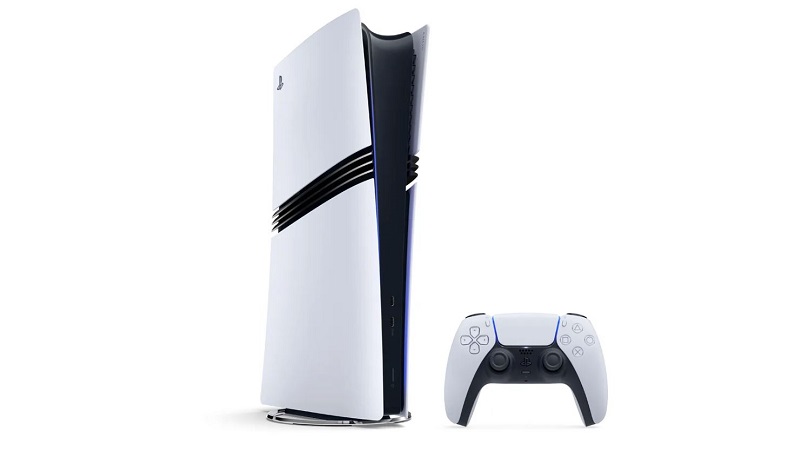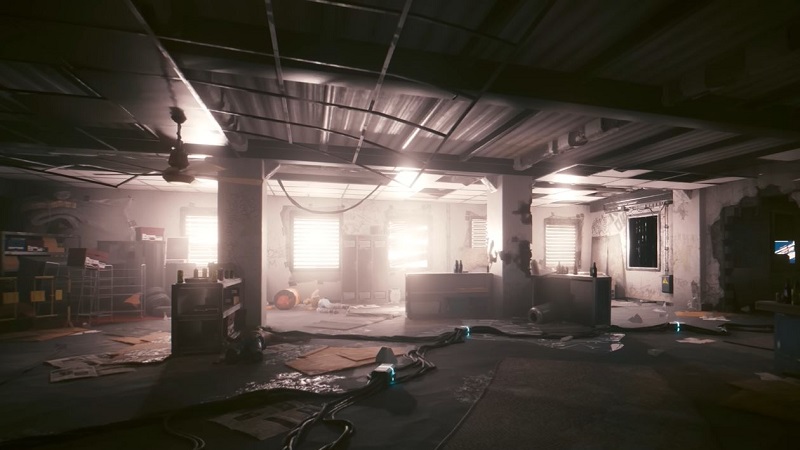- PS5 Pro Release Date – When Does PlayStation 5 Pro Come Out?
- PlayStation 5 Pro Price – How Much Does A PS5 Pro Console Cost?
- What Are The PS5 Pro Specs – PS5 Pro Specs At A Glance
- PS5 Pro Dimensions, Size & Weight
- PS5 Pro CPU
- PS5 Pro GPU
- PS5 Pro Image Upscaling – PSSR
- PS5 Pro Accelerated Ray Tracing
- PS5 Pro Disc Drive
- PS5 Pro Teraflops
- PS5 Pro Memory
- PS5 Pro Fans/Cooling Solution
- PS5 Pro 3D Audio
- PS5 Pro Storage
- PS5 Pro DualSense Controller
- PS5 Pro Ethernet/WiFi
- PS5 Pro HDMI Ports
- PS5 Pro USB Ports
- PS5 Pro Bluetooth
- PS5 Pro Operating System
- PS5 Pro Backwards Compatibility
- PS5 Pro PSVR 2 Compatibility
- PS5 Pro Voltage, Power Consumption
- PlayStation 5 North American Price – $699.99
- PlayStation 5 European Price – €799.99
- PlayStation 5 UK Price – £699.99
- PlayStation 5 Japanese Price – ¥119,980
- Though the PS5 Pro will have to go some way to be be larger than the largest console ever made, it turns out the PS5 Pro is actually a bit bigger and wider than the PS5 slim, but smaller than the OG PlayStation 5. You can take a look at it below.
 PS5 Pro CPU
PS5 Pro CPU - With the current generation PS5 and PS5 slim hardware units leveraging the 6nm AMD Zen 2 microarchitecture with 8 cores and 16 threads and a clock speed at 3.5Ghz, we would be surprised if Sony would massively move away from from what it already has with the existing PS5 CPU. Instead, it is rumoured that Sony will once again be running the same 6nm AMD Zen 2 microarchitecture in PS5 Pro, albeit at a higher clock speed.
- The latest rumour leak (which has been corroborated by Tom Henderson at Insider Gaming and others as being legit) suggests that the the PS5 Pro CPU is actually identical to the standard PlayStation 5, with the exception being that the PS5 Pro boasts a ‘High CPU Frequency Mode”, which effectively takes the CPU to 3.85GHz and provides a 10% increase in CPU performance over the standard PS5 console. This dovetails with what the previously rumoured PS5 Pro CPU specs were – representing only a modest increase in CPU power over the standard PS5 console.
 Unreal Engine 5 games like The First Descendant should be able to run on PS5 Pro without the image quality sacrifices that are needed to maintain a decent framerate on the standard PS5. PS5 Pro GPU
Unreal Engine 5 games like The First Descendant should be able to run on PS5 Pro without the image quality sacrifices that are needed to maintain a decent framerate on the standard PS5. PS5 Pro GPU - When we come to the PS5 Pro GPU however, Sony is seemingly keen to provide a substantial upgrade here over the existing AMD RDNA 2 GPU used in the current generation PS5 console. The PS5 Pro GPU will feature a custom AMD RDNA 3 GPU running at around 2500-2800 MHz and boasting 60 compute units, versus the current AMD RDNA 2 GPU found in the PS5 which boasts just 36 compute units and a 2.23Ghz clock by comparison.
- We now know that the additional CUs in the PS5 Pro GPU will result in the Pro console being able to render at least 45% faster than the standard PS5 console. PS5 Pro GPU performance is further bolstered by an AI Accelerator that kicks out 300 TOPS of 8 bit computation / 67 TFLOPS of 16-bit floating point calculations, while deeply customised machine architecture also results in improvements to image upscaling like never seen before on any home console to date. Finally, the PS5 Pro also boasts no less than 30 WGPs that in turn spit out specialised BVH8 traversal shaders – marking a stark improvements on the 18 WGPs which run BVH4 traversal shaders on the regular PS5 console.
- Arguably what will serve as the centrepiece of the PS5 Pro’s improvements over the standard PS5 is the fact that specific hardware silicon is being set aside to deal with image upscaling. Already deployed in a software fashion thanks to the checkerboard rendering approach that was taken with PS4 Pro upgraded titles and some PS5 games, the thought here is that this upscaling work would be improved by the PS5 Pro performing it a hardware level in a similar fashion to Nvidia’s DLSS solution, resulting in better results whereupon games that are upscaled to 4K resolution (or beyond) would look much more indistinguishable from their native counterparts.
- For PS5 Pro Sony has confirmed that its mid-gen console refresh will support something called PSSR (PlayStation Spectral Super Resolution Upscaling), which is essentially Sony’s own proprietary take on the upscaling and image reconstruction techniques that are already used by hardware vendors such as AMD and Nvidia. PSSR is powerful enough to allow PS5 Pro to run games in 8K (properly this time) too!
- Alongside handling image and resolution upscaling at a hardware level, it’s also extremely likely by many accounts that the PS5 Pro will boast a similar hardware block to exclusively deal with processing advanced ray traced visuals. This is crucial for a forward-facing system, thanks in no small part to the fact that ray tracing is an extremely intensive rendering technique that taxes the GPU horrendously and this already evidenced by the use of ray tracing in PS5 games where visual trade offs in resolution, visual fidelity and sometimes framerate are apparent. With PS5 Pro, ray tracing would be entirely accommodated by specific hardware within the console set aside just for that – meaning that the PS5 Pro GPU could would then be free to worry about other stuff improving texture resolution, level of detail draw-in, improving framerates and all that other lovely stuff. There are additional dimensions to this too. With PS5 there is often a trade off in the quality of ray traced global illumination and reflections, whereas with PS5 Pro, if the mooted dedicated hardware is beefy enough to handle the much more advanced path tracing rendering pipeline, PS5 Pro owners could potentially enjoy high-end PC level ray tracing in a way that just hasn’t been possible.
- And indeed that’s exactly what has been confirmed by the latest leak – with the PS5 Pro boasting specialised hardware accelerated ray-tracing capabilities at 2x to 4x what the current PS5 console is capable of.
 Path tracing is the next frontier for ray tracing as it allows a wholly accurate interpretation of how light bounces off from multiple surfaces and is reflected in a game in real-time. It’s also an extremely resource intensive rendering task, but given how a handful of games already use it on PC, it would make sense that the PS5 Pro would support path tracing at the hardware level in order to provide Sony’s mid-gen console refresh with some much needed future proofing. PS5 Pro Optical Disc Drive
Path tracing is the next frontier for ray tracing as it allows a wholly accurate interpretation of how light bounces off from multiple surfaces and is reflected in a game in real-time. It’s also an extremely resource intensive rendering task, but given how a handful of games already use it on PC, it would make sense that the PS5 Pro would support path tracing at the hardware level in order to provide Sony’s mid-gen console refresh with some much needed future proofing. PS5 Pro Optical Disc Drive - The PS5 Pro does not ship with an optical disc drive. However, it can use a separately purchasable external optical drive – the same one that can be used by PS5 digital and PS5 slim consoles.
- The standard PS5 console kicks out 10.28 teraflops, and given that the PS5 Pro is apparently set to have a focus on running smarter and more efficient (with a key part of this approach being the dedicated hardware block for image upscaling) rather than just upping the base hardware, we can expect to see the PS5 Pro claw back some crucial performance that isn’t reflected in its teraflop count. The current set of leaked specs for PS5 Pro, put that Teraflop figure at 33.5 Teraflops – a gigantic leap over both the PS5 and Xbox Series S consoles.
- The PS5 Pro is set to boast 16GB of GDDR6 RAM – the same which shipped with the current generation PS5 console. However, what has been mooted is that the RAM in the PS5 Pro will be much faster, clocking in at a blistering 18000MT/s.
- Adding further legitimacy to the above, the PS5 Pro memory bus is apparently running at 576 GB/s (18000MT/s), representing a pleasingly chunky a 28% improvement over the standard PS5 console.
- With uptick in clock speeds and compute units, coupled with the faster RAM and new GPU upscaling blocks for resolution and ray tracing, I’d expect a more efficient version of the same liquid metal cooling arrangement used in the standard PS5.
- I would expect that the PS5 Pro would continue to leverage the 3D Tempest audio tech that is featured in the current gen PlayStation 5 console.
- With the (still very fast) internal SSD drive of the PS5 coming up to four years old, Sony is once again going back to the SSD well – confirming that the PS5 Pro will boast a 2TB SSD as standard.
- Given that the DualSense is a resoundingly decent controller, the PS5 Pro merely leverages the same controller that is already available to PS5 gamers.
 Of perhaps any part of the existing PS5 console it is the already excellent DualSense controller that needs to change the least. However recent rumours pointing to a version of the controller with improved battery life would be a perfect addition to the PS5 Pro’s overall hardware offering. PS5 Pro Ethernet/WiFi
Of perhaps any part of the existing PS5 console it is the already excellent DualSense controller that needs to change the least. However recent rumours pointing to a version of the controller with improved battery life would be a perfect addition to the PS5 Pro’s overall hardware offering. PS5 Pro Ethernet/WiFi - With the PS5 already supporting WiFi 6 for a number of years, it makes sense that for PS5 Pro Sony would want to include the newly minted WiFi 7 standard which provides greatly improved wireless connectivity and speeds – and they have. Even with that however, don’t expect your trusty old Ethernet port to go anywhere in the new console as many folks still use wired connections instead of wireless.
- With HDMI 2.1b being the new kid on the block that can enable 8K resolution at 60Hz and 4K resolution at 120Hz, in addition to support for resolutions up to 10K(!), it seems likely that for the sake of future proofing Sony will opt to go with this standard for PS5 Pro.
- For PS5 Pro, we would expect to see a similar selection of USB ports as seen on the PS5. Not only would a USB Type-C be essential for compatibility with the PS5, but so too would the presence of additional high speed USB Type-A ports also prove vital for ensuring compatibility with the vast range of external SSD drives and other accessories that existing PS5 owners currently enjoy.
- With the latest Bluetooth standard (v5.4) boasting more robust connections, better quality and lower power consumption this absolutely seems like an obvious inclusion in the PS5 Pro.
- The PS5 Pro OS will almost certainly be the same PS5 custom OS that supports instant resume, game activities, switching and more in order to ensure backwards compatibility.
- Given the fact that the PS5 Pro is a mid-gen refresh with similar silicon to the current generation PS5 console, it will certainly be able to run every existing PS5 title without issue. The same should also be applicable to PS4 games as well. Not only that, but not only will a growing list of current and future PS5 games ship with full PS5 Pro enhancements, more than 8,500 PS5 and PS4 games will benefit from improved framerates and higher resolutions out of the box, too.
 While it seems certain that the PS5 Pro will play every PS5 game without issue, it should also be expected that titles which ran poorly on the standard PS5 (such as 2023’s Lords of the Fallen) could make immediate use of the PS5 Pro’s extra technological grunt, resulting in improved image quality and smoother framerates, PSVR 2 Compatibility
While it seems certain that the PS5 Pro will play every PS5 game without issue, it should also be expected that titles which ran poorly on the standard PS5 (such as 2023’s Lords of the Fallen) could make immediate use of the PS5 Pro’s extra technological grunt, resulting in improved image quality and smoother framerates, PSVR 2 Compatibility - In a vein similar to how the PS5 Pro will be compatible with all PS5 games, so too should we expect that Sony’s second mid-gen refresh console will be fully compatible with PSVR 2, as well. In terms of whether or not the PS5 Pro could offer visual upgrades to PSVR 2 titles, the answer is a resounding yes – especially if those PSVR 2 games happen to leverage the notoriously heavy Unreal Engine 5 graphics engine or other similarly taxing middleware.
- This is where things get a little trickier. With all of those advances in the silicon, it’s almost certain that the PS5 Pro will consume a chunk more power than the current PS5 console. As to exactly how much – that will depend on precisely what is going on under the hood – and hopefully Sony won’t be making us wait too much longer for a full set of confirmed PS5 Pro specifications.
- Latest PS5 Pro News
- All Best PS5 Exclusive Games – A Complete List Of Stunning PlayStation 5 Exclusives
- Best PS5 Games Ranked – 36 Of The Best PlayStation 5 Games In 2024
- Upcoming PS5 Games 2024 – The Best PS5 Games Coming Soon
- New PS5, PS4 Games Release Dates In 2024 And Beyond – All Upcoming PS5, PS4, PSVR2 Games
- Best PS5 Split Screen, Local Co-Op Games Ranked
- Best PS5 Kids Games Ranked – The Best Kids Games On PlayStation 5
- Best Free PS5 Games Ranked – Great PS5 Games At Zero Cost
- Best PS5 FPS Games Ranked – The Best First Person Shooters On PlayStation 5
- Best PS5 Indie Games Ranked – The Best Indie Games On PlayStation 5
- Best PS5 Fighting Games Ranked – The Best PS5 Brawlers You Can Play
- Best PS5 Horror Games Ranked – The Scariest Games On PlayStation 5
- Best PS5 Strategy Games Ranked – The Best Strategy Games For PS5
- Best PS5 Zombie Games Ranked – The Best Zombie Games On PlayStation 5
- Best PS5 Platformer Games Ranked
- Best PS5 Cyberpunk Games Ranked – The Best Cyberpunk Games On PlayStation 5
- Best PS5 Detective Games – The Best Detective Games On PlayStation 5
- Best PS5 Racing Games Ranked – The Best Racing Games On PlayStation 5
- Best PS5 JRPG Games Ranked
- Best PS5 Online Games Ranked
- Best PS5 Puzzle Games Ranked
- PS5 Enhanced Games List – Every PS4, PS5 Game With Enhanced Graphics Modes
- Every PS5 Game With New Game Plus
Source: https://www.psu.com/news/ps5-pro-specs- ... ease-date/
